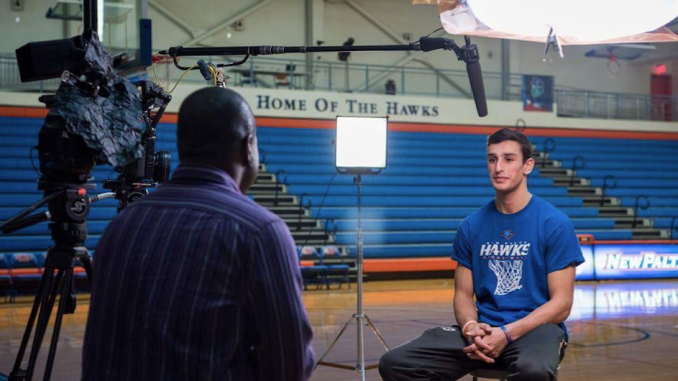
Other than love for the game, most Division III athletes have very little in common with our Division I counterparts. Third-year guard Nick Paquette however, does have one thing in common with second-year guard Andrew Jones at the University of Texas that will impact them both for the rest of their lives.
Paquette and Jones were both diagnosed with leukemia at the young age of 20 in the midst of promising collegiate basketball careers. Paquette was diagnosed with a rare form of blood cancer, Chronic Myeloid Leukemia, on April 29, 2017. Since then, he has had a hematological response, meaning that his white blood cell count has returned to normal and is still being treated for a molecular response, but he has made great progress.
Jones, however, began his journey just a few weeks ago. Jones is also an NBA prospect averaging 13.5 points for the University of Texas this year. After missing four games with an undisclosed illness, the University of Texas released a statement from his family regarding his diagnosis.
“We know Andrew’s a fighter with a strong family and our thoughts, prayers and support are fully behind them,” Texas athletic director Chris Del Conte said according to CBS Sports. “At the University of Texas, we will do everything in our power to provide all of the resources we can to assist Andrew and his family.”
Paquette heard about Jones’ case as he was leaving practice one afternoon after he received a text message from his mother, sharing the article. After attempting to contact the University of Texas Athletic Department, Nick’s mother, Roxanne Paquette, got in touch with college basketball writer Jeff Eisenberg at Yahoo Sports in order send a message of hope to Jones and his family.
“The reaction has been terrific so far,” Nick Paquette said. “Everything I’ve been hearing about him is very positive, I’m just trying to share a positive message and everyone I come in contact with is just amazed at how well this is being received.”
Soon after the letter was published, the Paquettes were contacted by the Jones family. When Jones’ godfather initially contacted Roxanne Paquette, she said that she was nervous because they wanted to send Jones the most respectful letter possible, but the families have exchanged nothing but tears and well-wishes since.
“No one on this team fights alone,” Roxanne Paquette said. “Leukemia has met its match and we can’t wait to see [Jones] walk back on the court to play!”
Shortly after, the Paquettes received another surprising contact, this time, it was ESPN. Nick Hetherington, a feature producer at ESPN’s Longhorn Network reached out to Nick wanting to do a segment on Paquette and Jones. Nick agreed and on Friday, Jan. 27, a camera crew arrived at the Athletic & Wellness Center.
“That was surreal, I’m still processing that now because it feels so surreal,” he said. “We’re Division III athletes, you know, bottom of the barrel in collegiate sports so we don’t really get that much press. Just getting my story out there on a national level, it really does feel amazing.”
Head coach Keith Kenney said that he is impressed with the intimacy Paquette shared in his letter and is confident that it will be helpful to anyone in a similar situation.
“I think it’s an honor for ESPN to have Nick share his story with them,” he said. “We all go through bad times in life and most of us keep them private, but for Nick to want to share and help others just shows what a selfless, giving person he is.”
ESPN spent hours with Paquette gathering footage, reading his letter and conducting a very emotional interview. In his letter to Jones, Paquette recalls his own struggle, shock and terror at the time of his diagnosis.
“I read that you experienced persistent fatigue and exhaustion in the weeks leading up to your diagnosis. I know all too well what that’s like,” he wrote. “Every day last season, I felt tired and lethargic. I lacked my usual strength and explosiveness during games and I’d come out of the locker room afterward sunken-eyed and ghostly pale. I’m 6-foot-3, and I often didn’t even have the energy to try to drive to the hoop or dunk.”
Although Paquette said he was terrified of his diagnosis, he was reassured by doctors that he would make a full long-term recovery and would even be able to return to the court if his body was able. In his letter, he offered Jones similar reassurance.
“Once I heard that, there was never a doubt in my mind that I would get back on the court, basketball is in my genes,” he said. “It has been my passion since kindergarten. I wasn’t going to let leukemia stop me from doing what I love.”
Paquette also wrote in the letter that he did not have an example to follow of a basketball player returning to the game after being diagnosed with leukemia as he would an ACL or other sports-related injury. So, he took it day-by-day, little-by-little and was cleared to play by his first game this season on Nov. 17. Now, more than halfway through his season, he said he feels the best he’s felt in two years.
His message to Andrew remains to continue the fight, push through the tough days and stay positive. He said he hopes to see Andrew back on the court starting for Texas University next season and a subsequent, successful career in the NBA.
“Don’t let leukemia stop you from doing something that you love,” he said.
